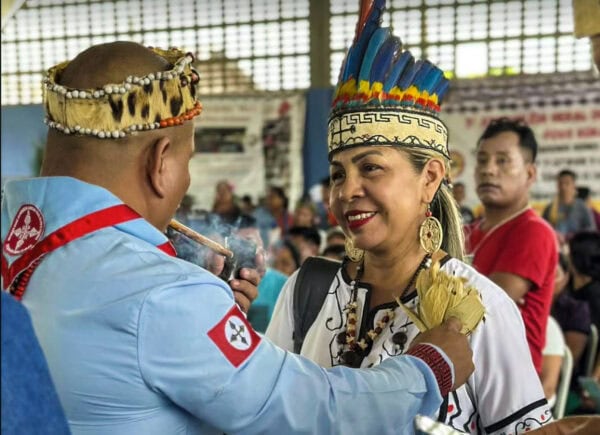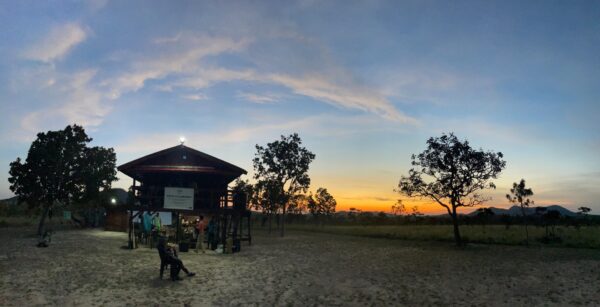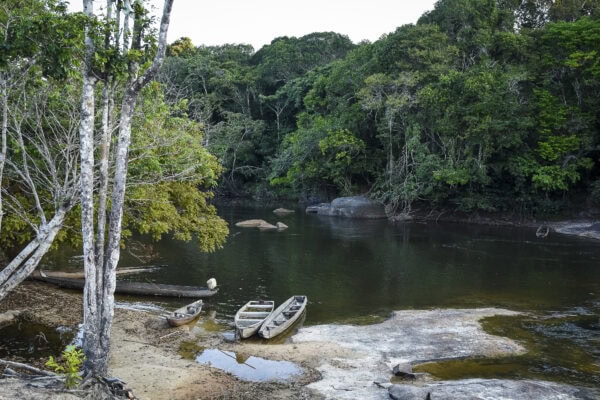
After Meta, the department (state) of Caquetá is the second Colombian department to pass a comprehensive indigenous public policy. Pictured here is one of the 15 workshops from which the policy guidelines arose. Photo: Semana.com
On November 12, 2015, the 10,181 indigenous inhabitants of the Colombian department (state) of Caquetá compiled all of their needs and their historically violated rights in a single document. Participating in the consensus-building exercise were indigenous associations, seven communities belonging to the Indigenous Council of Caquetá (CODIC), and the departmental government. Supporting the process were the Colombian Interior Ministry and the Amazon Conservation Team, among other institutions.
Development of the policy arose from a diagnosis of the current status of the indigenous communities living in Caquetá, which revealed a striking finding: in the department, there are 10,180 indigenous people—not 6,000 as indicated by the latest figures from DANE, Colombia’s national statistical agency. Subjects such as community life plans, land protection, indigenous-led education and the preservation of native languages were the main issues that a group of 500 indigenous delegates and officials from the local, departmental and national government discussed during several meetings between 2013 and 2015 in the context of that which CODIC has named their "leadership school."
"This case is exemplary because it has managed to integrate the needs of the different communities who are in the department, and a policy to resolve these issues was agreed upon between more than 10,000 indigenous persons and the departmental government while respecting the tradition of these communities. The dialogue between the indigenous communities and the State has ceased to resemble a shopping list with isolated requests—such as infrastructure and land protection, for example—and the involvement now will be much more comprehensive," said Carolina Gil, director of Amazon Conservation Team Colombia.
The 140-line policy is accompanied by an ordinance issued by the Departmental Assembly for mandatory implementation during the next regional government that will take office on January 1, 2016. Alvaro Pacheco, elected governor in October 2015, and the new municipal mayors of Caquetá must include the approved indigenous policy guidelines in their respective development plans.
Many of the indigenous groups living in this department are covered by a governmental plan to safeguard indigenous communities, as Colombia’s history of armed violence left them in a high degree of vulnerability. Hundreds of Amazonian indigenous Huitotos arrived in Caquetá following the rubber exploitation period (early twentieth century), as did Embera and Nasa individuals displaced by violence in Choco and Risaralda. For this reason, the participants in this process considered the policy not only an achievement in terms of inclusion, but an early victory in a battle.
To Waira Jacanamijoy, the departmental coordinator for culture and communications, "What has happened here is a model of what should be a participatory exercise in a nation that has overcome violence and plans to ensure its inhabitants that this will not be repeated through processes of inclusion."
Last week, the process continued with the installation of the first permanent consensus-building council, intended to help shape the development of a departmental development plan based on the approved public policy. There, representatives of various government ministries, indigenous leaders and officials at the national level began to define the prioritized guidelines and applied methodologies for implementation. The threat to the territory posed by petroleum explorers that have settled in the region and the construction of a forest highway are among the main concerns of these communities.
In sum, for the first time, the department of Caquetá decided to build peace with the indigenous communities and to engage in ongoing conversations with them. The next step will be the convening of meetings of the consensus-building council through March 2016 in order to coordinate the development plans with the new public policy guidelines.
Media Relations
For press release inquiries, please contact us at info@amazonteam.org.
Related Articles
Share this post
Bring awareness to our projects and mission by sharing this post with your friends.




